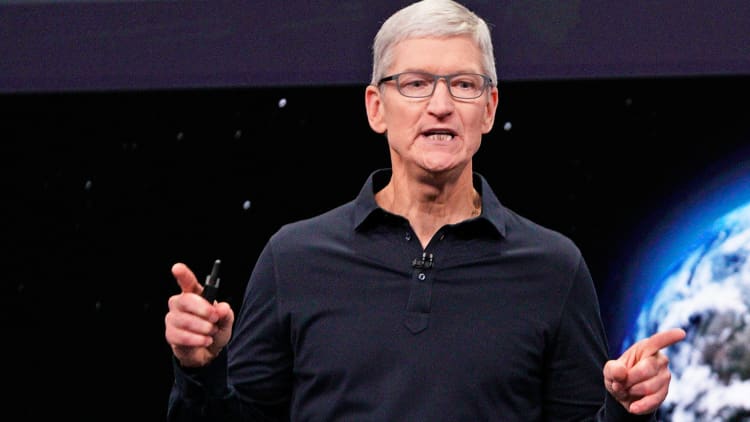Comcast and Charter have learned a hard lesson as they build out their mobile offerings: this is Apple's world, and they're just living in it.
As part of their deal to carry the iPhone with their fledgling mobile plans, Apple has compelled the two largest U.S. cable companies to sell large numbers of other Apple devices as well, according to people familiar with the matter. (Comcast owns NBCUniversal, the parent company of CNBC.)
Both Charter and Comcast offer wireless service as part of a joint mobile virtual network operator (MVNO) agreement with Verizon, originally agreed to in 2012. Comcast, which started its sevice in 2017, has about 1.5 million Xfinity mobile subscribers, and Charter, which started last September, had more than 300,000 as of March 31.
The cable providers decided they could not offer a viable mobile service to compete with Verizon, AT&T, Sprint and T-Mobile without carrying the iPhone, giving Apple ample leverage in negotiations, said the people. Extracting the best deal from partners is standard business, but it's a reminder of Apple's significant strength over the broader telecommunications ecosystem as federal regulators lay the groundwork for potential antitrust cases against the largest technology companies.
While the exact details of Comcast and Charter's agreement are private, Comcast has to sell a certain number of iPads, in the thousands, at a subsidized cost -- with Comcast paying for the difference between the discounted price and the retail price, the people said. The deal helps Apple sell more iPads, a chief area of concern for Apple when the device maker first struck the agreement with Comcast two years ago.
Comcast sells the 6th generation 32 GB 9.7-inch cellular iPad for $422.99. Apple and Charter retail the same device for $459.
Charter has a different agreement with Apple because the second-largest U.S. cable company allows its customers to use Apple TVs as replacement set-top devices for Charter's legacy boxes. Comcast doesn't allow Apple TVs to replace its Xfinity X1 boxes. As a result, Charter doesn't have the same subsidized sales requirement for iPads that Comcast does.
Charter sells Apple TVs at $7.50 per month for 24 months -- or $180, the retail cost of an Apple TV. Alternatively, a customer can lease a Charter set-top box for $7.50 per month. In other words, Charter offers an Apple TV at the same price as a Charter set-top box, but a customer ends up owning the Apple TV and returning the Charter box.
Charter has become the largest third-party seller of Apple TVs because of the agreement, two of the people said.
The mobile providers gain some benefits from the agreement with Apple. Mobile devices such as iPads and Apple Watches, which Comcast has also recently begun selling, enhance the value of Comcast's wireless service. And customers may prefer navigating through an Apple TV than a clunkier, older Charter user interface.
Apple has long-running relationships with more established carriers in the U.S. and around the world, and it's common for companies like AT&T and Verizon to sell a variety of Apple products in addition to the iPhone. Apple's products are designed to work together in an ecosystem, so it's logical that an iPhone buyer might want to buy other Apple products in the same transaction.
Apple has more than 45 percent market share for U.S. smartphones, according to Kantar research. Apple's iPad revenue growth began to slow in 2016 and declined on an annualized basis during the first two quarters of 2017, prompting Apple to push the large iPad selling requirement on Comcast, one of the people said.
Apple declined to comment.
Disclosure: Comcast owns NBCUniversal, the parent company of CNBC.
WATCH: Everything Apple announced at its WWDC keynote in 280 seconds.




